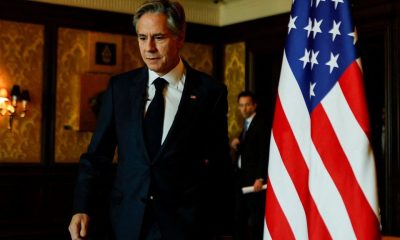AFRICA
Winners And Losers From Tuesday’s Primaries
Voters in seven states headed to the polls on Tuesday, deciding on candidates to represent their party in the 2018 midterms. Primary ballots cast across New York, Mississippi, Colorado, Maryland, Oklahoma, South Carolina, and Utah would upend politics as usual and provide early cues into how the general elections might unfold come November.
As the nation still processes results from last night, here are some early takeaways on what went down.
Winner: The Progressive Movement
A ten-term New York incumbent Joe Crowley, whose 14th congressional district includes the eastern Bronx and part of north-central Queens, lost his seat to Alexandria Ocasio-Cortez. The results are sending shivers down the spine of Democratic establishment – Crowley, after all, has been one of the most powerful congressmen and was in consideration for House Speaker.
Ocasio-Cortez, a 28-year-old political novice, is a born and bred New Yorker and an active member of the Democratic Socialists of America. After working for Sen. Ted Kennedy of Massachusetts and community organizing for Bernie Sanders during the 2016 presidential season, Ocasio-Cortez launched her own campaign in 2017 – using single-payer healthcare system, federal job guarantees, and greater working class protections as the rallying cry.
The Maryland gubernatorial primary only fomented the strong progressive showing by putting the Democratic nomination in the hands of Ben Jealous, former NAACP President and the state’s first would-be black governor. While Jealous’s election is by no means as unusual as that of Ocasio-Cortez, the fact that his commitment to a slate of progressive policies – Medicare For All, tuition-free colleges, and legalization of recreational marijuana – was potent enough to triumph over a more centrist Rushern Baker has not gone unnoticed by the moderate wing of the Democratic Party. Jealous’s candidacy won the endorsement of some of the nation’s most outspoken progressive activists: from Sen. Bernie Sanders of Vermont via businessman Ben Cohen to comedian Dave Chappelle.
Loser: The Democratic Establishment
Politics, as members of the Democratic establishment would once again come to realize, is a zero-sum game. A progressive candidate’s victory is a moderate candidate’s loss, and vice versa.
Alexandria Ocasio-Cortez’s viral campaign ad, revolving around the notion that not all democrats are equal and those benefiting from corporate donations do not have the voters’ best interest in mind, embodies the newly-enlivened tension between the progressive and moderate factions.
The progressive movement, which saw the fresh light of day with the rise of Bernie Sanders and boasts the most energetic base of young voters in modern times, sent the Democratic leadership into a reflective trance. Questions remain whether moderate Democratic officeholders – their political experience, fundraising advantage, and access to the party coffers notwithstanding – would be able to hold onto power.
If Ocasio-Cortes could emerge victorious with about $600,000 in fundraising dollars compared to Crowley’s $3 million, and Jealous’s lack of political experience proved far from enough to put off voters, there is a credible fear that progressive candidates across the country would be ever emboldened to take their fight with the moderates to the ballot box.
Winner: Donald Trump
The Tuesday primaries sealed two major victories for President Trump: in South Carolina and his home turf of New York.
Governor Henry McMaster of South Carolina, who was one of the first politicians in the nation to get behind Trump’s candidacy in 2016, won the Republican primary ticket by defeating businessman John Warren. Although primary race was unlikely to factor into South Carolina’s partisan balance of power come November, Trump chose to return the favor anyway by campaigning for McMaster – elevating the fierce loyalist by more than 10 percentage points in the opinion polls.
The McMaster victory confirms that Trump’s word goes a long way in South Carolina. Earlier this year, Rep. Mark Sanford of the state’s 1st congressional district lost his nomination to the House after accusations of being “very unhelpful” and “nothing but trouble” by the president.
Trump’s impact could be felt in New York as well, where Rep. Dan Donovan – securing endorsement via president’s Twitter account – triumphed over Michael Grimm.
Even Mitt Romney, who once described then-candidate Trump as a “phony” and a “fraud”, saw it fit to loosen his rhetoric to cruise to the GOP nomination in Utah.
Featured Image Via Flickr/Anthony Scutro
AFRICA
The UK paid Rwanda an additional $126 million for the contested migrant plan.
As the tab for Britain’s controversial proposal to relocate asylum seekers to the East African nation continues to increase, the United Kingdom paid Rwanda an extra 100 million pounds ($126 million) in April. This was in addition to the 140 million pounds it had already provided Rwanda.
Even though the Rwanda project is at the core of the policy that British Prime Minister Rishi Sunak is employing to discourage illegal immigration, there have been no individuals sent to Rwanda as of yet due to legal challenges that have taken place since the initiative was introduced in 2022.
After Sunak’s immigration minister resigned this week, the polarizing policy is now regarded as a danger to Sunak’s leadership, which is anticipated to be challenged in the election that will take place the following year.
According to a letter that the British Ministry of the Interior issued on Thursday, the United Kingdom plans to give Rwanda fifty million pounds in addition to the 240 million pounds it has already provided to the East African nation.
The opposition Labour Party criticized the disclosures regarding the rising cost of a scheme that legal experts warned could collapse. Some parliamentarians within Sunak’s party are also expected to express their disapproval of the idea.
A statement by Yvette Cooper, the shadow interior minister for the Labour Party, on social networking site X, said, “Britain cannot afford more of this costly Tory chaos and farce.”
On Friday, however, the newly appointed minister for legal migration, Tom Pursglove, explained what he called the “investment” of 240 million pounds. He stated that once the Rwanda policy was operational, it would reduce the money spent on hosting asylum-seekers in the United Kingdom.
“When you consider that we are unacceptably spending 8 million pounds a day in the asylum system at the moment, it is a key part of our strategy to bring those costs down,” Pursglove explained to Sky News.
Pursglove stated that the money donated to Rwanda would assist in the country’s economic growth and help get the asylum relationship with the United Kingdom up and running.
There was no connection between the money sent to Rwanda and the treaty that the two nations signed on Tuesday, according to the letter from the Ministry of the Interior.
The treaty aims to respond to a ruling by the Supreme Court of the United Kingdom, which stated that the deportation plan would contravene local laws based on international human rights standards.
“The Government of Rwanda did not ask for any payment in order for a Treaty to be signed, nor was any offered,” according to the correspondence.
After Robert Jenrick resigned from his position as immigration minister on Wednesday, Sunak made a plea to fellow Conservative parliamentarians on Thursday to come together in support of his Rwanda proposal. He stated that the emergency legislation the government had drafted to get the scheme up and running did not go far enough.
Africa
UK interior minister travels to Rwanda to resurrect asylum plan.
On Tuesday, the Minister of the Interior of the United Kingdom, James Cleverly, came to Rwanda to sign a new treaty. This was done to circumvent a court judgment that blocked the government’s contentious policy of transferring asylum seekers to the East African nation.
The Rwandan plan is at the core of the government’s attempt to reduce migration, and it is being closely monitored by other nations who are considered to be considering policies that are comparable to Rwanda’s.
In a decision handed down a month ago, the Supreme Court of the United Kingdom stated that such a move would violate international human rights norms embedded in domestic legislation.
Following the decision, the United Kingdom has been making efforts to revise its agreement with Rwanda to incorporate a legally binding treaty that guarantees Rwanda would not remove asylum seekers brought there by the United Kingdom. This is one of the primary concerns of the court.
Several attorneys and charitable organizations have said that it is highly improbable that deportation flights will begin before the election. With a lead of more than ten percentage points in the polls, the opposition Labour Party intends to abandon the Rwanda policy if it is victorious.
A meeting between Cleverly, who arrived in Kigali, the capital of Rwanda, on Tuesday morning, and Vincent Biruta, the country’s Minister of Foreign Affairs, is scheduled to take place to sign the agreement.
“Rwanda cares deeply about the rights of refugees, and I look forward to meeting with counterparts to sign this agreement and further discuss how we work together to tackle the global challenge of illegal migration,” Cleverly says.
The United Kingdom aims to transfer thousands of asylum seekers who came to its beaches without authorization to Rwanda under the plan that was agreed upon the previous year. This discourages migrants from crossing the Channel from Europe in tiny boats.
In exchange, Rwanda has been given an initial payment of 140 million pounds, equivalent to 180 million dollars, along with the promise of additional funds to cover the costs of housing and medical treatment for any deported persons.
THE PRESSURE
A great deal of pressure is being put on Prime Minister Rishi Sunak to reduce net migration, which reached a record high of 745 thousand people in the previous year, with the vast majority of migrants entering through legal channels.
“Stop the boats” is one of the five goals that Sunak has set for his government. The influx of asylum seekers who pay people smugglers for their crossings of the Channel, which frequently take place in boats that are overloaded and not seaworthy, is one of the aims that Sunak has set.
The Supreme Court determined that the Rwanda plan should not be implemented because there was a possibility that refugees who were deported would have their claims incorrectly evaluated or that they would be sent back to their country of origin to suffer persecution.
In the latter part of this week, it is anticipated that the new treaty will be followed by the release of legislation declaring Rwanda a so-called safe nation. This law is intended to prevent legal challenges against the planned deportation flights.
Despite this, this will probably result in a fresh set of political and legal difficulties.
An immigration attorney at Harbottle & Lewis named Sarah Gogan stated that the government’s policy will be challenged due to Rwanda’s history of violations of human rights provisions.
“Rwanda is an unsafe country and this is not a quick fix,” added the politician. “You cannot in a matter of weeks or months reform a country and turn it into one with an impartial judiciary and administrative culture.”
Another “gimmick” was what Yvette Cooper, the spokesperson for the Labour Party’s home affairs department, called the most recent measures proposed by the administration.
Whether or not to design the law in a way that would avoid subsequent legal challenges is still up for debate by the administration.
Several members of the Conservative Party in parliament are putting pressure on the government to incorporate a “notwithstanding” clause into Rwanda’s policy. This clause would disapprove the domestic and international human rights commitments of the United Kingdom regarding Rwanda.
However, some politicians within the ruling party, such as Robert Buckland, have stated that such a move would be “foolish” and undermine the Good Friday Agreement, which is primarily responsible for ending three decades of carnage in Northern Ireland. This is because the European Convention on Human Rights supports the treaty.
AFRICA
Madagascar leader wins presidential vote, constitutional court says
On Friday, the High Constitutional Court of Madagascar certified Andry Rajoelina, the current President of Madagascar, to be the victor of the election a month ago, essentially granting him a third term in office.
Following the dismissal of several challenges submitted against the preliminary results by the electoral board, the court said that Rajoelina collected 58.96% of the votes that were cast.
Florent Rakotoarisoa, the chairman of the High constitutional court, stated that “Andry Rajoelina is elected as the president of the republic of Madagascar and is taking his functions as soon as the swearing (is conducted) comes to an end.”
The rejected challenge was submitted by the politician Siteny Randrianasoloniaiko, who received 14.39% of the vote, according to the court. This was one of the challenges that was denied.
Ten of the thirteen candidates chose not to participate in the election; nevertheless, their names were already on the ballot, so they could still divide the remaining votes. The court reported that the turnout was 46.35 percent.
The election on November 16 was preceded by weeks of demonstrations, during which the opposition accused Rajoelina of having fostered conditions that were unjust to the election.
The charges that the vote was rigged have been refuted by Rajoelina, and the army has issued a warning against any attempts to destabilize the country.
As far as the opposition is concerned, the voter turnout for the election was the lowest it has ever been in the country’s history.
Hajo Andrianainarivelo, a former minister who was one of the candidates who chose to abstain from voting, has committed to fight against what he has described as a lack of respect for the rules of the state and the tyranny of the people.
“The popular fight begins now,” he declared on Thursday referring to the ongoing conflict.
Rajoelina, now 49 years old, initially won power in a coup in 2009. After resigning from his position as the head of a transitional authority in 2014, he went on to win another election in 2018 and regain his position as president.
-

 Europe7 months ago
Europe7 months agoRussia’s Shoigu accuses the West of seeking to expand the Ukraine war to the Asia-Pacific.
-

 Geopolitics & Foreign Policy6 months ago
Geopolitics & Foreign Policy6 months agoTurkey’s Erdogan says he may visit Egypt soon, discuss Gaza patients -media.
-

 America8 months ago
America8 months agoRepublican US House to hold first Biden impeachment inquiry hearing
-

 Geopolitics & Foreign Policy6 months ago
Geopolitics & Foreign Policy6 months agoRussia deploys new nuclear missile in Kaluga region – RIA
-

 Geopolitics & Foreign Policy6 months ago
Geopolitics & Foreign Policy6 months agoCeasefire takes hold in Gaza ahead of hostage release; aid enters enclave.
-

 Gender, Sexuality & Identity8 months ago
Gender, Sexuality & Identity8 months agoGreenland women ask Denmark for compensation over involuntary birth control.
-

 Global Issues & Cooperation8 months ago
Global Issues & Cooperation8 months agoHuman rights in Russia have ‘significantly deteriorated’ – UN expert.
-

 ECONOMY5 months ago
ECONOMY5 months agoFinland will sign a defense pact with the US.
















